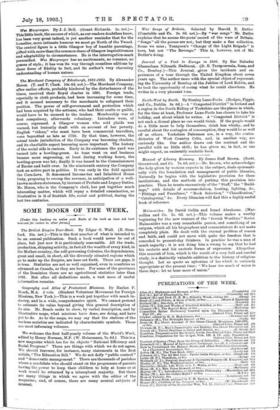The Merchant Company of Edinburgh, 1681-1902. By Alexander Heron. (T.
and T. Clark. 108.6d. net.)—The Merchant Company, after earlier efforts, probably hindered by the disturbances of the times, received their Royal charter in 1681. Foreign trade, especially in cloth products, had been increasing for some time, and it seemed necessary to the merchants to safeguard their position. The power of self-government and protection which had been acquired by the artisans, who had their crafts or guilds, would have to be secured to the traders. Membership was at first compulsory, afterwards voluntary. Intruders were, of course, repressed. A Glasgow woman who sold plaids was warned, but leniently dealt with on account of her poverty. English "riders," who must have been commercial travellers, were boycotted as late as 1750. By that time, however, the actual trade jurisdiction of the Company was becoming obsolete, and its charitable aspect becoming more important. The history of the social side is curious. Early in its existence the yard was turned into a bowling-green. As tune went on and business became more engrossing, at least during working hours, the bowling-green was let; finally it was leased to the Commissioners of Excise and built over. In the nineteenth century the Company took an active part in politics. It was early in the field against the Corn-laws. It denounced Income-tax and Inhabited House Duty, proposing to recoup the revenue, in anticipation of a well- known modern statesman, by increase of Probate and Legacy Duties. Mr. Heron, who is the Company's clerk, has put together much interesting matter, which will repay a detailed examination, so illustrative is it of Scottish life, social and political, during the last two centuries.










































 Previous page
Previous page